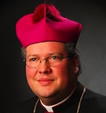
Prime Bishop Anthony Mikovsky
Who Do You Say Jesus Is?
Within the Gospel reading from the 21st Sunday in Ordinary Time we are present for a dialogue between Jesus and His disciples in the region of Caesarea Philippi. “[Jesus] asked His disciples, ‘Who do people say that the Son of Man is?’ And they said, ‘Some say John the Baptist, but others Elijah, and still others Jeremiah or one of the prophets.’ He said to them, ‘But who do you say that I am?’ Simon Peter answered, ‘You are the Messiah, the Son of the living God.’ And Jesus answered him, ‘Blessed are you, Simon son of Jonah! For flesh and blood has not revealed this to you, but My Father in heaven. And I tell you, you are Peter, and on this rock I will build My Church, and the gates of Hades will not prevail against it.’” (Matthew 16:13-18)
This Gospel reading stands as a summit to the Gospel readings from the past several weeks in this liturgical year. As we find ourselves in the middle of St. Matthew’s Gospel, Jesus is being revealed to us through these Sundays. It is only in St. Matthew’s Gospel that we have the story of the Three Magi (the Epiphany) as an expression of God revealing who Jesus is for us and for the world, but in fact these epiphanies continue to happen throughout this entire Gospel.
We saw this in a very explicit way in the Solemnity of the Transfiguration which was celebrated on
Sunday, August 6. Jesus was transfigured before the apostles Peter, James and John and He was seen conversing with Moses and Elijah. We have also seen this in lesser ways over the past two Sundays as well. On the 19th Sunday in Ordinary Time we encountered the miracle of Jesus walking on water. While we certainly see this as Jesus revealing His power in this miracle over nature, more importantly at the moment when Peter is also walking on water, we see him begin to sink when he allows the cares and concerns of the world to intrude. Jesus then lifts him up and declares, “You of little faith, why did you doubt?’ (Matthew 14:31) We, of course, see that when Peter took his eyes off of Jesus, it was only then that he began to sink.
On the 20th Sunday in Ordinary Time we encounter the healing of the Canaanite’s woman’s daughter. Although this woman was not among the Jewish people, when she placed herself at the feet of Jesus and did Him homage, her faith was commended and the miracle was granted. Jesus said to her, “Great is your faith! Let it be done for you as you wish. (Matthew 15:28) Along with the Gospel readings from these Sundays, if we examine the rest of the Gospel of Matthew near these portions we also see that there are many other ways in which Jesus reveals Himself. Jesus feeds five thousand; He cures many at the Sea of Galilee; and He feeds four thousand.
But as a culmination to these revelations, Jesus asks a question to His disciples and through them to us. “Who do you say that I am?” (Matthew 16:13) A important first point is a realization concerning where this question was asked. Jesus was in the town of Caesarea Philippi, or in other words the Caesarea in the area of Philip’s Tetrarchy. The city was named in honor of Caesar Augustus by Herod the Great and he also had built there a temple in honor of Caesar Augustus. So in this city where all things pointed to the lofty and powerful in the world, in the city where Caesar Augustus was honored as a god, Jesus asks the disciples what they really think about Him and His mission.
In response to everything that they had seen and encountered regarding Jesus, it is Peter, the spokesman for the apostles, who says “You are the Messiah (the Christ) the Son of the living God.” In answer Jesus says to Peter, “You are Peter (Petros) and upon this rock (petra) I will build my Church. In answer to the question, the Apostles take the revelation that they have continue to receive and put it into a confession, “You are the Christ, the Son of the living God.”
Jesus goes on to say that the Church will be built on this confession. The word for ‘Church’ that is used here is ‘ekklesia,’ which means a called-out assembly. This reminds us that the Church is not just a group of individuals who gather out of their own volition. Rather, they are a group called out of the world because of their confession that Jesus is the Messiah, Jesus is the Son of the living God. And of course, we know that once this confession is made, we accept all that Jesus has done for us in His passion, His death upon the cross and His resurrection to eternal life. We accept that He has given Himself as food for the world in the Holy Eucharist.
In this we must reflect on the fact that it is not enough for us just to read the question of Jesus and the answer of the Apostles, but we must also realize that the same question is asked of us: “Who do you say that Jesus is?” I am sure that each of us can answer the question with items such as, ‘Well this is what the Church says…” or “This is what the world thinks…” or “This is what I learned in catechism…” or “This is what my parents believe…” But none of those really get to the heart of the matter.
The issue is that each of us must answer for ourselves, “Who is Jesus for me?” And the answer to this question cannot just be a matter of our thinking or intention. This distinction was made in a writing of Cardinal John Henry Newman called “Real
Assent.” He contrasted this with a mere notional assent. In notional assent, we acknowledge that a thing is true, in this case that Jesus is the Messiah, the Son of the living God, but that this reality has no significant effect on our life or our living. Real assent is that belief that penetrates all that we are and all that we do. Everything in our life, every action, every thought, every relationship is permeated with the knowledge and reality that Jesus is the Messiah, the Savior, our Lord and the Son of the Living God.
If this is the case for us, then in fact we truly do not have any choice but to be called out from the rest of the world to be in the assembly of this Jesus Who is Lord and Savior and Christ. Since Jesus is to be found within His Church, in Word and in Sacrament, then I must be there as well to worship Him, to be joined with Him in prayer and to receive Him in Holy Communion.
So my brothers and sisters, I encourage all to reflect on this question for each and every one of us. As we find ourselves at Church, reflect on the reason we are gathered there while worshiping Almighty God and receiving our Lord in Holy Communion. If you have not been to Church in a while, reflect on this question as well and realize that Jesus is still calling His followers, His disciples, out from the world to reside within His Church.
Jesus said that upon the confession of Peter, He would build His Church. Let our confession be the same, that Jesus is the Messiah, the Son of the living God, and that His Church, His kingdom, will continue to be built upon us, as His disciples.

